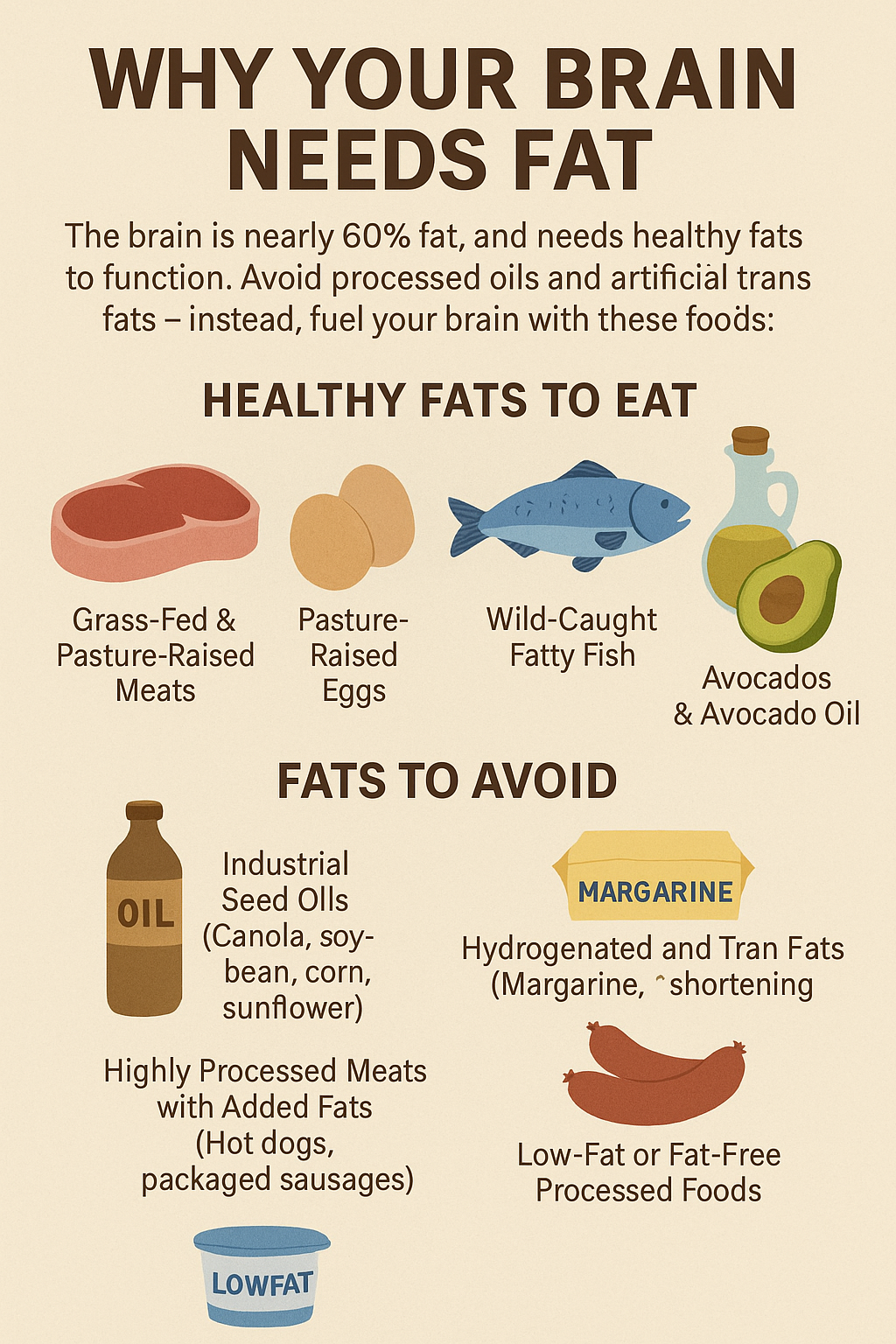Why Your Brain Needs Fat: The Truth About Healthy Fats, Meat, and Mental Wellness
For decades, we were told to fear fat. Low-fat labels filled grocery store shelves, and dietary guidelines promoted margarine over butter and lean foods over rich, nourishing ones. But science—and common sense—now tell us what our ancestors always knew: your brain needs fat to function well.
Your Brain Is Mostly Fat
The human brain is made up of nearly 60% fat. Fats are essential to the structure of brain cells, the communication between neurons, and the production of neurotransmitters that regulate mood, memory, and focus. Without fat, your brain can’t function properly.
Essential fatty acids, such as omega-3s and omega-6s, are critical, especially DHA (docosahexaenoic acid), which is found in animal fats and serves as a significant building block of the brain.
Healthy Fats: What Your Brain Is Hungry For
Not all fats are created equal. Your brain thrives on healthy, natural fats, not processed oils or synthetic substitutes. Here are the best fats to support mental clarity, mood stability, and overall brain health:
- Grass-Fed & Pasture-Raised Meats
Beef, lamb, and other ruminants raised on pasture produce meat that’s higher in omega-3s, conjugated linoleic acid (CLA), and vitamin E. These fats nourish the brain, reduce inflammation, and support cognitive function. Organ meats, such as liver, are especially rich in brain-boosting nutrients.
- Pasture-Raised Eggs
Eggs are packed with choline, a nutrient crucial for memory and brain development, and they contain healthy fats that support brain structure.
- Wild-Caught Fatty Fish
Salmon, mackerel, sardines, and anchovies are rich in DHA and EPA, two omega-3 fats your brain needs to maintain memory and regulate mood.
- Grass-Fed Butter & Ghee
Full of vitamins A, D, E, and K2, as well as butyrate, a short-chain fatty acid that supports gut health and reduces brain inflammation.
- Avocados & Olive Oil
These plant-based fats are rich in monounsaturated fats, which support blood flow to the brain and aid in the absorption of fat-soluble vitamins.
Fats, Mood, and Mental Health
Low-fat diets have been linked to higher rates of depression, anxiety, and brain fog. Why? Because the brain uses fats to produce serotonin and dopamine, the chemicals that help you feel happy, motivated, and at peace.
Healthy fats also help stabilize blood sugar, preventing the emotional rollercoaster that often accompanies carb-heavy, low-fat meals. A brain fueled by fat stays calmer, focused, and resilient.
What to Avoid: Fats That Harm Brain Health
Not all fats are created equal. While your brain needs fat to thrive, certain fats can damage the brain, fuel inflammation, and contribute to mental health issues like depression, anxiety, and brain fog. These are the ones to watch out for:
- Industrial Seed Oils: These oils are highly processed and prone to oxidation, which leads to inflammation in the body and brain:
-
-
Typical examples: Canola, soybean, corn, sunflower, safflower, grapeseed, cottonseed oil
-
Why are they harmful:
-
High in omega-6 fatty acids, which, when out of balance with omega-3s, cause chronic inflammation
-
Often chemically extracted using hexane, a petroleum byproduct
-
Easily oxidize when heated, creating harmful compounds called aldehydes
-
Linked to increased risk of cognitive decline, Alzheimer’s disease, and mood disorders
-
-
-
- Hydrogenated and Trans Fats: These are artificially modified fats used to improve shelf life and texture in processed foods:
-
-
Familiar sources: Margarine, shortening, some commercial baked goods, fried fast food
-
Why are they harmful:
-
Raise LDL (bad) cholesterol and lower HDL (good) cholesterol
-
Interfere with brain cell communication
-
Increase the risk of stroke, memory loss, and depression
-
May disrupt neurotransmitter function, especially serotonin and dopamine pathways
-
-
-
Even small amounts of trans fats have been shown to harm heart and brain health. Thankfully, they are now banned or restricted in many places, but they can still be found in imported or unlabeled goods.
- Highly Processed Meats with Added Fats and Preservatives: While meat and animal fats are healthy when raised and prepared correctly, ultra-processed meats often contain artificial ingredients and low-quality fats:
-
-
Examples: Packaged sausages, deli meats, hot dogs, microwaveable meat products
-
Concerns:
-
Often made with cheap seed oils or mechanically separated meat
-
Contain additives like MSG (monosodium glutamate), sodium nitrite, and preservatives that may impact brain chemistry
-
May include hidden trans fats
-
-
-
Whenever possible, opt for whole cuts of meat from pasture-raised animals, or make your own sausage and cured meats at home using clean, high-quality ingredients.
- Low-Fat or Fat-Free Processed Foods: Ironically, many low-fat products contain harmful additives and sugars to compensate for lost flavor:
-
-
Examples: Fat-free yogurts, low-fat snack bars, diet dressings
-
Why they’re a problem:
-
Deprive your brain of the fats it needs for structure and function
-
Often replace fat with sugar, corn syrup, or artificial sweeteners that spike insulin and affect mood
-
-
-
Real Food, Real Clarity
Choosing whole, nourishing foods—including quality meats and healthy fats—isn’t just about physical health. It’s about mental resilience, emotional stability, and spiritual clarity. Our bodies were designed to thrive on food that comes from creation, not a chemistry lab.
At Jacob’s Ranch, we raise animals and grow food using regenerative methods that honor the land and nourish the soul. When we choose to eat from the abundance of nature, we support our bodies and our minds.
To learn more about the benefits of good fats for the brain, view The Effects of Nutrients on Brain Function.







Leave A Comment